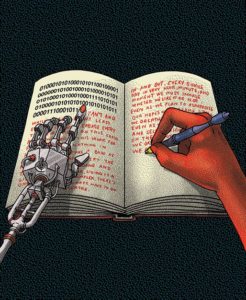Defining digital humanities at first can appear complicated but, to my mind, it’s simple: the digital humanities are ways of working to analyse the humanities (anything relating to human culture and society, past, present & future) with digital tools and techniques.
Some have attempted to define digital humanities as an academic realm in itself, occasionally over-mechanising the term digital humanities and isolating it as a unique field. Rather than incorporate these new ways of working into each and every field within the humanities, they see the use of digital tools as a rationale in and of itself to distinguish humanists from other humanists. This is a symptom of the transition from analogue and traditional techniques to new, digital tools of exploration.
The digital humanities to me, though, is not an isolated subject area – and is certainly not exclusive to the academy – but an indication that digital research tools, that can both augment traditional research into society and culture and inspire, even shape, that research, have been used.
Using tools to augment and shape research
If somebody is interested in abolitionists in the 19th century, analysing texts around their lives would be a good exercise and the digital humanities could be used to illustrate where speaking tours headed and where Frederick Douglass, for example, gave lectures throughout his life – augmenting traditional research.
The digitising and databasing of Vogue front covers allows those interested in fashion magazines to discover trends across the publication’s history such as a saturation bump in the 1980s when the favoured front cover was a full page blow-up of a model’s face – digital humanities shaping research and uncovering trends.
The use of digital tools (such as running texts through code and AI tools to identify trends, perform a sentiment analysis, locate key words, etc) adds to the ways in which somebody can explore their interest; this is the digital humanities.
It’s all humanities
Although there can be a tendency to rest comfortably in the narrowing segregation between the digital humanities and the analogue humanities, separating those interested in human society and culture from one another based on technique, time marches on. In retrospect, I hope we’ll find that we’re simply in the middle of a shift from just the tried and tested tools of old to the addition of faster, more thorough tools that can help expand our research and knowledge and adjusting to that change.
One day, though, the digital humanities will be seen as just another way of working by all those interested, becoming the humanities again. In the end, does it really matter what we call ourselves?*
* = yes.


